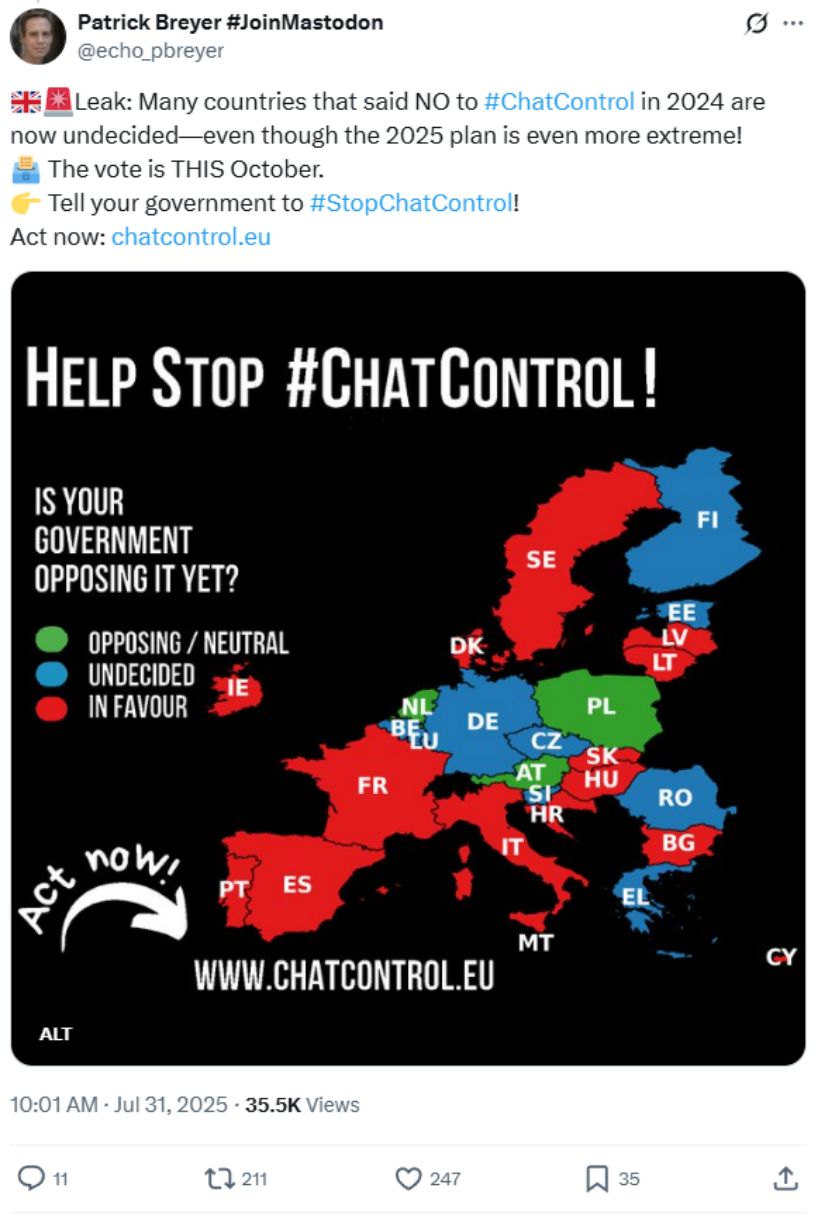EU’s Controversial Chat Control Proposal Nears Critical October Vote – Here’s What’s at Stake
The EU’s sweeping chat control proposal—dubbed 'mass surveillance on steroids' by critics—is barreling toward a decisive October vote. Privacy advocates and tech giants are bracing for impact.
Behind the curtain: Lawmakers claim the measures target child exploitation, but encrypted messaging apps warn it’s a Trojan horse for backdoor access. Signal and WhatsApp have threatened EU exits if the proposal passes.
The finance twist: Banks are quietly lobbying for exemptions, because nothing kills compliance budgets faster than real-time message scanning requirements. Meanwhile, crypto wallets remain the loophole nobody’s talking about—yet.

The legislation WOULD require messaging apps like WhatsApp, Signal, and Telegram to scan all private messages for illegal content, marking the most significant threat to digital privacy in Europe’s recent history.
What Chat Control Means for Users
The proposal, officially called the Child Sexual Abuse Material (CSAM) regulation, would force messaging services to use artificial intelligence to scan photos, videos, and text messages before they reach recipients. This scanning would happen on users’ devices through “client-side scanning” technology, effectively creating backdoors in encrypted communications.
Unlike current voluntary scanning by some platforms, Chat Control would make this surveillance mandatory for all communication services operating in Europe. The European Commission expects reports to increase by 354% once the system is fully implemented.
Users would face a stark choice: accept the scanning or lose the ability to send images, videos, and links through messaging apps. Professional accounts for military, intelligence, and police personnel would be exempt from scanning, highlighting concerns about the technology’s reliability and privacy implications.
Failed Attempts and New Danish Push
The proposal has struggled to gain support since its introduction in May 2022. Multiple EU presidencies have tried different approaches to win over skeptical member states.
Belgium proposed limiting scanning to shared media with user consent, while Poland suggested making the system voluntary rather than mandatory. Both versions failed to secure the necessary votes from EU governments.
Now Denmark, which began its EU presidency in July 2025, has made Chat Control a top priority. The Danish government plans to hold a decisive vote on October 14, 2025, despite ongoing opposition from key member states.
Growing Opposition from Tech Companies and Experts
Major encrypted messaging services have taken a firm stance against the proposal. Signal and other privacy-focused platforms have threatened to shut down their European operations rather than implement scanning technology that would undermine their security promises.

Source: @echo_pbreyer
The opposition extends beyond tech companies. In May 2025, 89 organizations including civil society groups, companies, and cybersecurity experts signed a joint letter urging the European Commission to abandon plans that would weaken encryption.
Privacy advocates point to troubling statistics about false positives in similar systems. Swiss federal police report that 80% of machine-generated reports turn out to be legal content, such as family beach photos. Irish authorities confirmed only 20% of reports from existing voluntary systems as actual illegal material.
Technical Concerns and Security Risks
Cybersecurity experts warn that creating backdoors for law enforcement would make everyone less secure. Any vulnerability that allows government access could potentially be exploited by criminals, foreign intelligence services, or hackers.
The European Court of Human Rights has already banned legal efforts to weaken encryption in Europe, ruling that permanent and comprehensive automated analysis of private communications violates fundamental rights.
Current encryption technology works because it creates secure channels that only the sender and recipient can access. Chat Control would fundamentally change this by requiring messages to be readable by AI scanning systems before encryption occurs.
Broader Surveillance Plans
Chat Control is part of a larger EU security strategy called ProtectEU. This initiative, announced in April 2025, aims to give law enforcement agencies the ability to decrypt private data by 2030.
The ProtectEU strategy represents a significant shift in European digital policy, moving away from the EU’s traditional role as a global privacy champion. The plan includes developing a “Technology Roadmap on encryption” to identify ways for authorities to access encrypted communications.
Crypto’s Role in Privacy Protection
The Chat Control proposal has renewed interest in cryptocurrency’s privacy features. As traditional messaging apps face potential surveillance requirements, users are exploring blockchain-based alternatives that operate outside government control.
Privacy-focused cryptocurrencies like Monero offer financial transactions that are much harder to track than traditional banking. This technology becomes more appealing when users worry about government overreach in digital surveillance. Self-custody wallets allow people to control their funds without relying on banks that might be required to report transactions.
The timing is significant. Major exchanges like Kraken recently delisted Monero from European markets due to regulatory pressure, showing how authorities are already targeting privacy tools. This creates a cycle where increased surveillance drives more people toward decentralized alternatives.
Decentralized messaging protocols built on blockchain technology offer another option. These systems don’t rely on central servers that governments can pressure or compromise. While still developing, they represent a potential technical solution to the surveillance concerns raised by Chat Control.
However, cryptocurrency’s privacy benefits come with trade-offs. These tools require technical knowledge that many users lack, and they can attract unwanted attention from authorities. The challenge lies in making privacy-preserving technology accessible to ordinary citizens who simply want to protect their legitimate communications.
The Stakes for Digital Privacy
The outcome of the October vote could reshape digital communications across Europe and set a global precedent for government surveillance powers. Success in Europe might encourage similar proposals in other regions, while failure could strengthen international norms protecting encrypted communications.
For ordinary users, the immediate impact would be the knowledge that all their private messages, photos, and communications are being automatically scanned and potentially reviewed by authorities. This represents a fundamental shift from the current expectation of private digital correspondence.
The proposal also raises questions about the EU’s commitment to digital rights and privacy protections that have made it a global leader in this area. The General Data Protection Regulation (GDPR) established Europe as a champion of digital privacy, but Chat Control would MOVE in the opposite direction.

